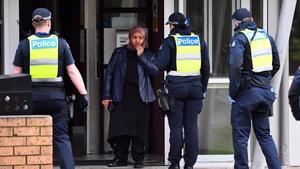 Police speak to a woman at one of nine public housing estates locked down due a spike in COVID-19 coronavirus numbers in Melbourne on July 6, 2020. (WILLIAM WEST / AFP)
Police speak to a woman at one of nine public housing estates locked down due a spike in COVID-19 coronavirus numbers in Melbourne on July 6, 2020. (WILLIAM WEST / AFP)
Australia has its first reported case of a person being reinfected with the COVID-19 virus.
The premier of the state of Victoria, Daniel Andrews, made the announcement on Oct 21 during a press conference, adding that the state had 10 new cases of the virus.
Victoria has been struggling to contain the virus spread with the capital Melbourne in lockdown for more than 100 days.
The patient who has been reinfected was first tested positive back in June, according to Andrews and has since been tested positive again
The patient who has been reinfected was first tested positive back in June, according to Andrews and has since been tested positive again.
The world’s first reported reinfection case was in Hong Kong in August and another more recently in the United Kingdom.
Professor Sarah Palmer co-director of the Centre for Virus Research at the Westmead Institute for Medical Research, said the announcement will fit with “a pattern seen elsewhere in the world”.
READ MORE: Australia's Uluru named among world's top 3 places to visit
“This tells us we still have much to learn about this virus and our bodies’ immune response to it,” she told China Daily.
“In particular, as the virus continues to evolve and mutate, infection with one of its strains may not protect us from another strain.”
Scientists say the reinfections compose a major challenge for vaccine efforts as many vaccines were developed to be active against strains identified early in the progression of the pandemic.
Professor Nigel McMillan, director in infectious diseases and immunology at the Menzies Health Institute, Griffith University, Queensland said: “It is unclear with these cases if this is truly reinfection or merely dead virus being shed.”
ALSO READ: Australia announces quarantine-free travel from New Zealand
“The idea of reinfection, however, is not surprising as we know that antibody levels against SARS-CoV-2 virus drop rapidly in naturally-infected patients. Indeed, by two months, one in five people have no detectable antibodies to the virus,” he said.
“The hope is that vaccines will produce a much more long-lived immune response and this problem will be reduced, but it probably won't be eliminated,” he told China Daily.
Hassan Vally, associate professor in epidemiology at Melbourne’s La Trobe University, said: “Although this is interesting and there is little detail to go on at this point regarding this Victorian case, it's really important not to attach too much weight to this finding.
“We do know that whilst infection by some viruses leads to lifelong immunity, there are others for which infection only leads to relatively short-term immunity.”


